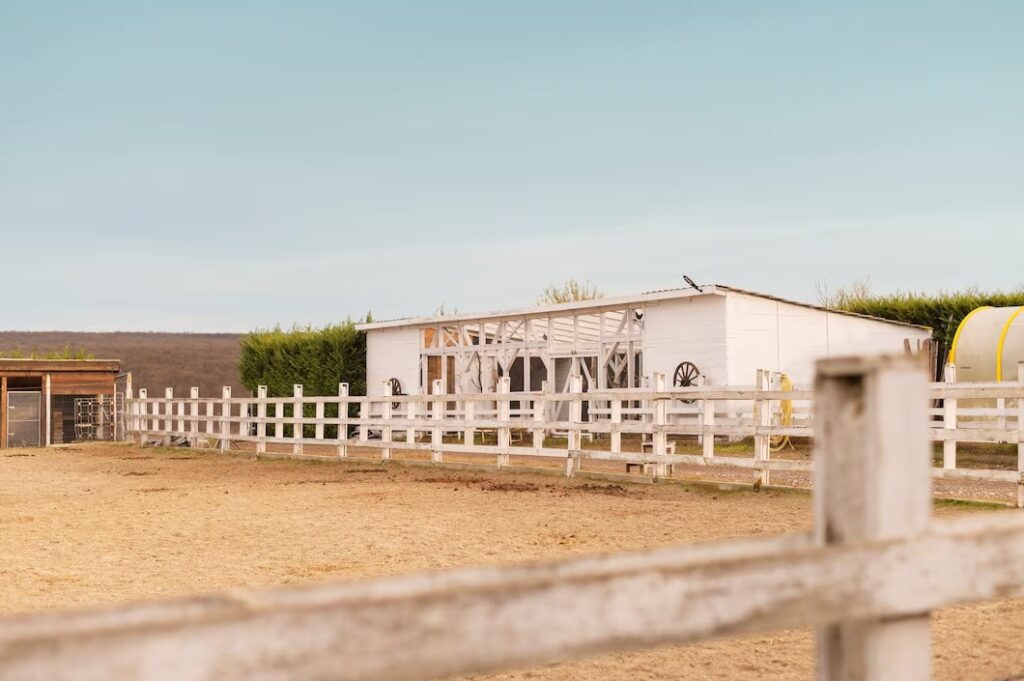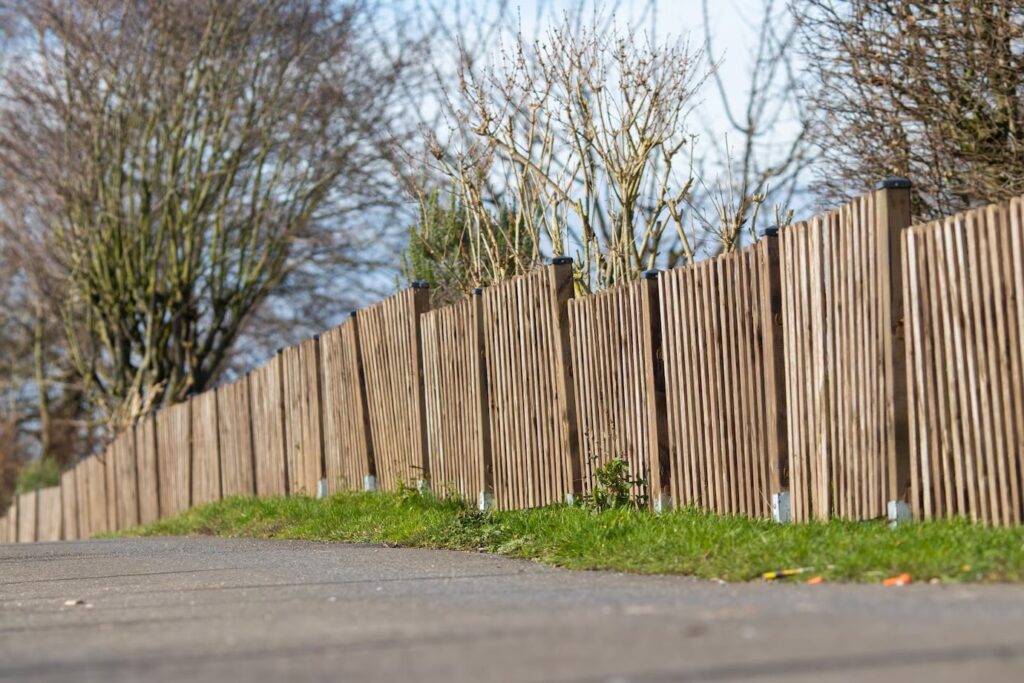- Free Estimates

Welcome to our in-depth guide on determining how much a fence costs! As a property owner or homeowner, you may want to install a fence for various reasons, such as privacy, security, or aesthetics. Before starting a fencing project, it’s vital to understand the elements that impact fence costs to ensure proper planning and budgeting. In this guide, we will examine the materials, designs, styles, and additional features that play a role in determining fence costs. Additionally, we will provide cost estimates for different fence materials, advise on controlling fence costs, and highlight the significance of getting multiple quotes from multiple fence contractors in Newtown, CT, or any other location. So, without further ado, let’s jump into the world of fencing costs!
When estimating a fence’s cost, several key factors come into play. Understanding these factors will help you make informed decisions and avoid unexpected costs during your fencing project.
Comparing Costs, Durability, and Maintenance The choice of fence material is a crucial factor affecting your fencing project’s overall cost. Different materials have varying costs, durability, maintenance requirements, and aesthetic appeal. Here’s an overview of common fence materials:
Gates are essential to most fences, providing access to your property. The cost of gates can vary depending on the material, size, design, and type of hardware used, such as hinges, latches, and locks. Custom gates or automated gates can significantly impact the cost of your fence project.
Before installing a fence, it’s important to check with your local authorities about any permits or regulations that may apply. Some areas may have specific fence heights, materials, and placement guidelines. Obtaining the necessary permits and complying with local regulations may add to the overall cost of your fence project. Therefore, it’s crucial to consider these costs when estimating the total expenses.
The condition of your site can also affect the cost of your fence project. If the area where the fence will be installed needs clearing, leveling, or other preparation work, it may add to the labor and equipment costs. Factors such as soil type, slope, and accessibility can also impact the complexity and cost of the installation process. Therefore, assessing your site’s condition and making any necessary preparations before starting your fence project is important.

Additional features or customization options can also impact the cost of your fence. For example, decorative elements such as finials, scrolls, or lattice panels can add to the material and labor costs. In addition, other features like post caps, lighting, or trim can add to the overall expense. Therefore, it’s important to carefully consider which additional features are essential for your fence and fit within your budget.
Labor costs can vary depending on factors such as location, availability of skilled labor, and complexity of the installation. Hiring a professional fence contractor can ensure proper installation and save time and effort. However, fence contractors may charge for labor based on an hourly rate or a flat fee. Therefore, obtaining multiple quotes from a reputable fence contractor in Newtown, CT, or your local area is important to compare labor costs and choose the best fit for your budget.
When estimating the cost of your fence project, it’s crucial to consider warranty and insurance costs. Some fence contractors in Newtown, CT, may offer warranties on their workmanship or provide product warranties on the materials used. It’s important to understand the terms and coverage of any warranties and factor them into your budget. Additionally, insurance coverage for liability or property damage may also be necessary, depending on the scope and size of your fence project. Be sure to inquire about insurance coverage and include it in your overall cost estimate.
Seasonal factors can also impact the cost of your fence project. During peak seasons, such as spring and summer, fence contractors may be busier and charge higher service prices. In contrast, during off-peak seasons, such as fall or winter, contractors may offer discounts or lower rates. Considering the seasonality of fence installation and timing your project accordingly can save you money on labor costs.
The location and accessibility of your property can also impact the cost of your fence project. If your property is in a remote or hard-to-reach area, it may require additional transportation or equipment costs for the fence materials and installation. Similarly, obstacles on your property, such as trees, rocks, or uneven terrain, may add to the complexity and cost of the installation process. It’s important to assess the location and accessibility of your property and communicate any potential challenges to your fence contractor to obtain an accurate cost estimate.
Post caps are decorative elements that add a polished look to your fence. They come in various materials, styles, and prices, ranging from simple caps to decorative caps with solar lights or ornamental details.
Finials and scrolls are decorative elements commonly used in ornamental iron fences or other custom designs. They can add elegance and visual interest to your fence but may increase the cost due to the additional labor and materials required for installation.
Privacy slats or screens can be added to chain links or vinyl fences to enhance privacy and block visibility. They come in various materials, colors, and styles and can affect the cost of your fence project.
Depending on the material used, your fence may require paint, stain, or sealant to protect it from the elements or enhance its appearance. The cost of these finishing treatments should be factored into your overall fence budget.
Now that we have discussed the various factors that impact how much the fence costs, let’s explore some tips for managing your fence project budget effectively.

When installing a fence, obtaining multiple quotes from fence contractors is crucial in understanding the range of costs associated with your project. By obtaining multiple quotes, you can ensure that you are getting a fair price and avoid overpaying for your fence installation.
It’s essential to remember that different fence contractors may have varying pricing structures, labor rates, and material markups. Therefore, comparing quotes from at least three contractors can give you a better understanding of the pricing and help you decide which contractor to choose.
When you obtain quotes, ask for a detailed breakdown of the costs, including materials, labor, and any additional features or accessories. This will help you compare quotes and understand the differences in pricing.
When planning your fence project, it’s essential to prioritize your needs versus your wants. Determine what features and customization options are essential for your fence and what are simply aesthetic or luxury additions. This will help you stay within your budget and avoid unnecessary expenses. For example, if security is your top priority, investing in high-quality material and sturdy construction may be more important than decorative finials or scrolls.
As mentioned, the material you choose for your fence significantly impacts the cost. So, research different material options and their costs to best fit your budget and needs. For example, if you’re on a tight budget, chain link or vinyl may be more affordable than wrought iron or cedar. However, remember that cheaper materials may have lower durability or aesthetic appeal, affecting long-term maintenance and replacement costs.
When considering the long-term maintenance and replacement costs of a fence, it’s important to consider the climate in your area, the amount of exposure to the elements, and the level of wear and tear the fence will experience. This can help you choose a material that will be durable and requires minimal maintenance over time.
It’s also important to consider the cost of any necessary repairs or replacements. For example, a fence damaged by weather or other external factors may need to be repaired or replaced sooner than anticipated, adding to the overall cost.
By considering a fence’s long-term maintenance and replacement costs, you can make a decision about which material to choose and avoid surprise expenses down the line. A professional fence contractor in Newtown, CT, can help you choose a durable fence material that requires minimal maintenance, ensuring that your fence lasts for many years to come.
Another consideration when managing your fence project budget is whether to do it yourself (DIY) or hire a professional contractor. DIY may seem like a cost-effective option initially, but it requires time, effort, and expertise in fence installation. Mistakes in DIY installation can result in costly repairs or replacements. On the other hand, hiring professional fence contractors in Newtown, CT, ensures proper installation, quality workmanship, and warranty coverage. While it may cost more upfront, it can save you money in the long run by avoiding potential mistakes or issues.
When determining how much a fence costs, it’s crucial to consider the obvious expenses such as materials, labor, permits, and any extra features and the potential hidden costs that may arise during the installation process. These hidden costs can be anything from unexpected ground conditions to underground utilities or tree removal, to name a few.
Conducting a thorough site evaluation before starting your fence project is recommended to avoid these hidden costs. This involves checking for underground utilities, examining soil conditions, and identifying potential challenges or obstacles. Partnering with a knowledgeable fence contractor in Newtown, CT, who can assess the site and provide a reliable estimate based on their expertise, can also help reduce the likelihood of hidden costs, ultimately leading to a more accurate estimate of how much your fence project will cost.
When calculating the cost of a fence, it’s important to consider how much a fence costs. Many fence contractors in Newtown, CT, offer financing plans or recommend third-party financing options.
Before choosing a financing option, thoroughly reviewing the terms, such as interest rates, fees, and repayment schedules, is crucial. First, ensure that the financing plan aligns with your budget and financial goals and that you can comfortably make the monthly payments. Then, to get the best deal, compare different financing options and shop for the best rates and terms.
If you’re wondering, “How much does a fence cost?” there are several factors to consider. The cost of your fence project will depend on the materials you choose, the design you want, the length of the fence, any additional features you may need, and the labor required to install it. To manage your budget effectively, conducting thorough research, obtaining multiple quotes, prioritizing your needs, considering long-term maintenance and replacement costs, and deciding whether to go for a DIY or professional installation are important.
By carefully considering these factors and making informed decisions, you can ensure that your fence project in Newtown, CT, or any other location, stays within your budget while meeting your requirements for aesthetics, functionality, and security. For expert advice and assistance in planning and executing your fence project, don’t hesitate to contact Newtown Fence Contractor. We can help you with personalized quotes and expert guidance on your fence project. Contact us today to get started on your fence project!